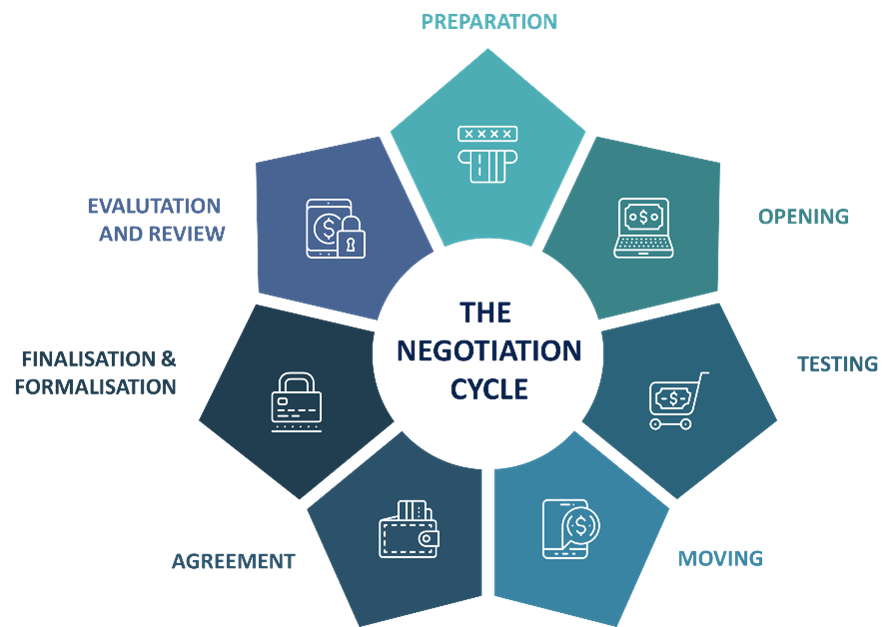The Different Stages of a Negotiation
"Negotiation is a process!"

Negotiation is a process! In the previous articles on the subject of negotiation, we have covered Behaviours and Soft Skills in negotiation and the importance of Preparation in Negotiation. In this article we are going to review the Process of negotiation, which goes through the following stages:

As we have already discussed, Preparation is 90% of success, Fail to Prepare, Prepare to Fail. This hasn’t changed but preparation has been covered comprehensively in a previous article. If you’re in an appropriate room, with the right team around you, empowered with comprehensive, valuable data, a strategy, knowing your key objectives and able to practice your emotional intelligence and soft skills, you’re on the right track! For further detail in this area, please review the recent article relating to the ‘Importance of Preparation in Negotiations.’
So we move on to the Opening stage, the Supplier is in reception, are you ready!
Let’s start from the top, are you going to collect them from reception or send a junior member of staff? So what you may say? What if the supplier grills your member of staff on the walk to the meeting room and extracts some significantly key information from them, just by asking a few simple friendly questions like, ‘How’s business, I hear things are going well?’ and your staff member unloads a whole host of valuable, internal only information to the supplier. If you send somebody else to collect the supplier, brief them on what to say and what not to say.
So now they have arrived in the room, what happens next? Is it meaningless to say, ‘How are you?’, ‘How was the journey?’, ‘How was your holiday in Thailand?’ Is it a waste of resources to offer them drink and a chocolate biscuit? – No! You are establishing rapport, good rapport is critical to negotiation success – Basic stuff!
"It is harder to say no to somebody you like."
You need to put people in a comfortable position, with sufficient space, with the appropriate facilities and a drink. Easy conversation will make them receptive to what is coming. Take a mental photograph of their body language, this is them in their comfortable place, watch for how it may or may not change later.
At this juncture take control, go through the agenda, introductions, people, roles etc. be assertive. You may choose to completely change the tempo of the meeting here from the off with something like, ‘Thanks for coming, but I need to advise you right now that there is no way we can accept a price increase, in fact we are excited to hear about what cost down opportunities you can bring to the meeting.’ You have just taken control and completely changed the pace of the meeting, 20 seconds earlier the supplier was talking about being on a beach in Thailand!
After the introduction and a successful opening you will move into the Testing stage of the negotiation. Here you and the supplier will test your preparation and assumptions. They may advise you that your turnover with them has reduced year on year when is hasn’t. They may tell you that their quality is excellent and On Time in Full (OTIF) is 100% when it isn’t. If you have not prepared well – they will be right! More importantly they will now know that you are ill prepared and will take full advantage of it.
At this stage you are aiming to secure your ‘Must’s’ from your MIL, (Kennedy) but on a one-way basis. From the persuasion methods, covered in a previous article, utilise emotion and logic to counter any arguments depending on the scenario. Secure as much as you possible can from these one-way levers before you ultimately need to start to trade.
You are now entering the Moving stage of the negotiation, where you will engage in ‘Bargaining’. Remember to trade upwards, trade your ‘Likes’ for ‘Musts’ and ‘Intends.’ The other party does know the value of your Variables so you can trade a ‘Like’ in a manner that it looks critical to you when it isn’t.
As the offers diminish and you are moving from 32 days to 30 days on payment terms, or from 2.5% to 2.6% regarding a discount, you know this negotiation is coming to end, you are at the Agreement stage so deal with it accordingly. Be assertive here and close it out, using closed questions like ‘I think we have reached the end here do you agree?’ Reply, ‘Yes.’ Ok then, should I summarise what has been agreed?’ Reply, ‘Yes.’ Following this meeting, I will formalise our agreement and send it through to by e-mail, thank you for coming.’ Close it out, do not let the meeting go on needlessly, time is precious to everybody.
Always take ownership for the formalities, actions and minutes. If you do this then the actions and minutes will reflect your recollection of what has been agreed, no surprises. If you let the supplier send through the actions and minutes, it may not reflect what you think has been agreed. This can be disastrous, damaging to the relationship and almost take the negotiation back to the start. Do not let this happen, take control.

When the supplier has left the building, you now need to conclude on the Finalising and Formalisation Stage of the negotiation with regards to what has been agreed. If it is actions and minutes, complete them and send them through by e-mail. If it is a contract, ensure that it is concluded and ratified by the correct people with delegated authority. Make sure all affected stakeholders have a copy and file it electronically and maybe even physically in the appropriate place.
Is this the end? It can be if you do not wish to learn and develop from the experience. To grow and develop you need to undertake a thorough Evaluation and Review Stage from the negotiation, ideally with your negotiation team straight after the meeting. This is the best time for feedback in this environment.
Start with a simple question by asking each member of the team how they thought the meeting went, what went well? and what could have been done better? You will probably be surprised by the range of replies that you may receive, reflecting the different perceptions of the individuals within your team and you may take some tremendous learnings from this exercise.
Secondly, you can review with the team if your preparation was good enough, could it have been done better? Was there a particular point in the meeting where your lack of preparation was exposed?
You can objectively review your objectives, Must, Intends, Likes, how did you do against this. An objective evaluation of we got all of our ‘Must’s’, most ‘Intend’s’ and some ‘Like’s’, is a much better quantitative reply to somebody who asks if the meeting went well, than a subjective ‘yes’, based on nothing objectively.
You could complete a negotiation journal, keep it simple, noting down the ‘what went well’ and ‘what didn’t go well’ elements of the meeting.
Negotiation is a life-long journey of continuous improvement. I would always doubt anybody who told me that they were an excellent negotiator. An excellent negotiator will advise you that they can always improve!

This article was written by Gary Tinsley FCIPS, BA (Hons), DTLLS, Co Founder of SR Strategic Sourcing Ltd.
For further details and information on Managing your Supplier base and how this can help your organisation please contact us or click through to the following pages
Improving your negotiation Skills
Introduction to Procurement Processes Public Sector
